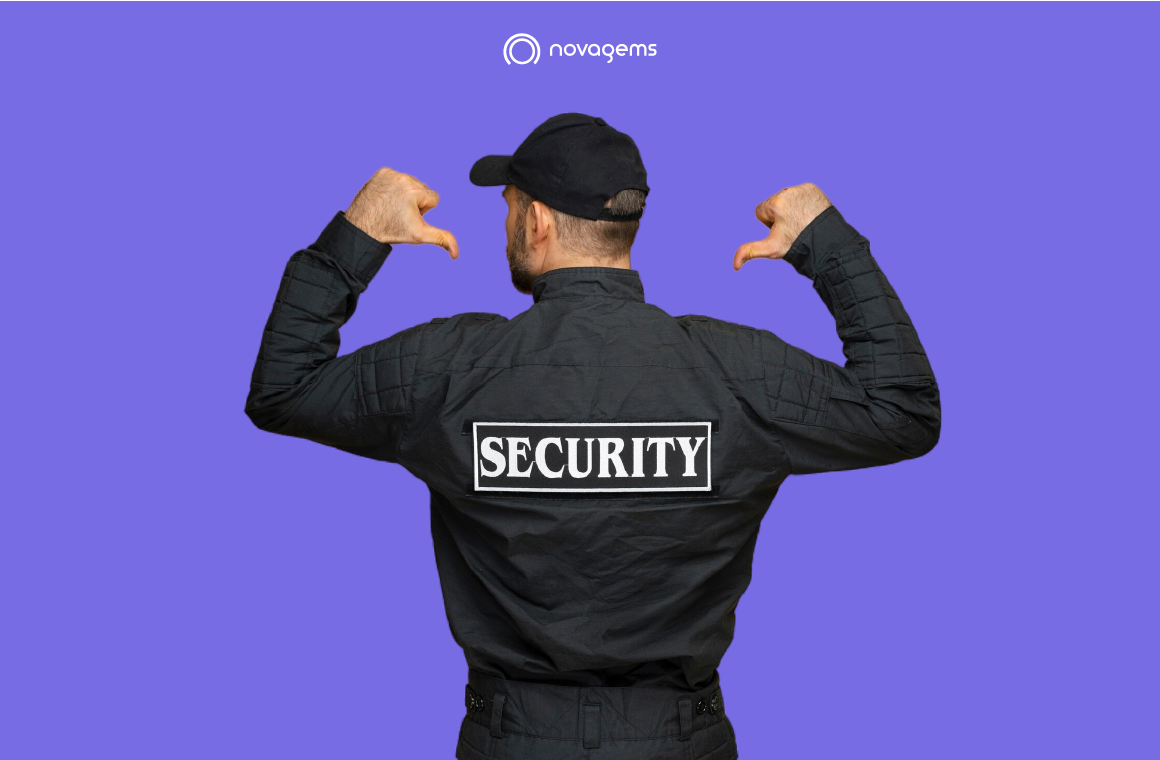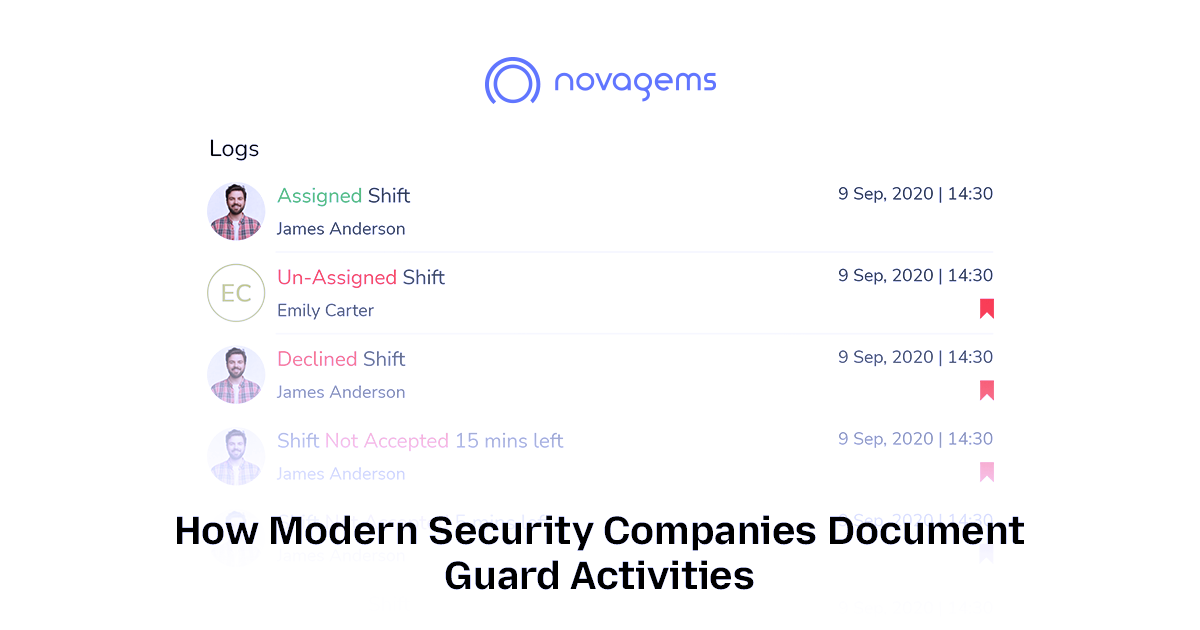How to Conduct Security Guard Performance Evaluation
Published on: Wed, Jan 15, 2025
Read in 14 minutes

Key Takeaways:
- A good security guard performance evaluation boosts safety, professionalism, and team morale.
- Structured reviews using KPIs and real-time tools make evaluation fair and effective.
- This guide explains how to evaluate security guards with clear steps, and examples.
Why Security Guard Performance Evaluation Is So Important
Security guards are often the first line of defense for businesses, buildings, and people. Their actions impact not just physical safety but also client satisfaction, public trust, and company reputation.
That’s why conducting a security guard performance evaluation is critical. It’s not just a routine HR task, it’s a strategic process that helps:
- Identify top performers
- Address areas for improvement
- Reduce turnover
- Maintain consistent quality across shifts and sites
A well-structured evaluation helps security companies improve operations and gives guards the feedback they need to grow in their role. And according to Gallup’s research, highly engaged employees achieve 14% of more productivity.
Any security company is built on the trust and hard work of your security guards. Evaluating the performance of security guards is essential for maintaining high levels of security and ensuring that guards perform their duties effectively. Regular evaluations can identify areas where improvements are needed and help reinforce good practices. But you need to learn how to conduct security guard performance evaluations correctly. Then only it will be helpful and you can see some results. Your security guards are the ones with whom your clients see and interact. They are mainly responsible for maintaining peace and security. And it is very important that they are well-trained to do so.
A well-structured performance evaluation process also helps security guards grow professionally and stay motivated to perform their best. In this blog, we’ll explore how to conduct security guard performance evaluations in a way that is simple and effective.
The Importance of Security Guard Performance Evaluation
Evaluating security guard performance is important for several reasons. First and foremost, it helps ensure that the safety and security of the environment are upheld. Security guards are responsible for protecting people and property. And their effectiveness in doing so needs to be regularly assessed to ensure they are meeting expectations.
- Improved Security: Through evaluations, supervisors can check whether security guards are performing their duties as required. Are they vigilant? Are they responding to incidents promptly? These assessments help ensure that any security gaps are identified and corrected, improving the overall safety of the location.
- Professional Development: Performance evaluations provide valuable feedback to security guards. Constructive criticism can help them understand their strengths and areas that need improvement. It can also highlight opportunities for further training, helping them grow professionally.
- Accountability: When security guards know they will be evaluated, they tend to stay more focused and aware of their actions. Regular assessments hold them accountable for their performance and encourage them to consistently follow the rules and protocols.
- Retaining Talent: Evaluations also help management identify top-performing security guards. High-performing guards can be rewarded or promoted, which helps in retaining valuable employees. This recognition motivates others to improve their performance as well.
- Client Trust: For businesses that hire security personnel, having a structured evaluation process reassures clients that the guards are being properly monitored. This helps build trust and strengthens the relationship between the security company and the client.
Setting up the Evaluation Process
Before conducting a performance review, it’s crucial to establish a clear and organized process. This ensures that all security guards are assessed fairly and consistently.
- Define Evaluation Goals: The first step is to define the objectives of the evaluation. What exactly do you want to achieve? Are you looking to assess overall performance, response times, or specific skills such as communication? Having clear goals will guide the entire process.
- Create Performance Metrics: Develop specific criteria that align with the security guard’s job responsibilities. Some common performance metrics include:
- Attendance and Punctuality: Does the security guard consistently show up on time and maintain a regular schedule?
- Vigilance: Is the guard attentive during shifts and capable of identifying potential threats?
- Response to Emergencies: How effectively does the security guard respond to incidents like alarms, medical emergencies, or security breaches?
- Professionalism: How does the guard interact with the public, clients, and co-workers? Are they polite, helpful, and professional in their conduct?
- Develop Evaluation Tools: Use standardized forms or evaluation templates to ensure consistency across all evaluations. These tools could include checklists, rating scales, and open-ended questions. The use of digital software can also help streamline the evaluation process.
- Communicate the Evaluation Process: It’s important that the security guards understand the evaluation process and what will be assessed. Clearly communicate the criteria, how often evaluations will take place, and what the outcomes might be. This helps avoid confusion and ensures that guards know what is expected of them.
Conducting the Evaluation
When it’s time to conduct the evaluation, follow a structured approach to ensure accuracy and fairness.
- Observation: One of the most effective ways to assess a security guard’s performance is through direct observation. Supervisors can observe guards during their shifts to see how they handle different situations. Are they patrolling diligently? Are they attentive at access points? Observing guards in real time gives a true picture of their performance.
- Reviewing Reports and Logs: Security guards are often required to submit incident reports, shift logs, and other documentation. Reviewing these reports can offer valuable insights into their attention to detail, how they handle incidents, and their communication skills. Are the reports detailed and accurate? Do they describe the incidents clearly?
- Gathering Feedback: Another method is to gather feedback from clients, coworkers, and even visitors who interact with the security guard. This can provide additional perspectives on the guard’s professionalism, communication, and general conduct.
- One-on-One Meetings: After gathering all the necessary data, it’s important to hold a face-to-face meeting with the security guard. During this meeting, discuss the findings of the evaluation and provide constructive feedback. Be sure to recognize the guard’s strengths while also highlighting areas for improvement.
- Goal Setting: After discussing the evaluation, work together with the security guard to set specific, achievable goals. These goals should be clear and measurable, such as improving response times or enhancing customer service skills. Regular check-ins should be scheduled to track progress on these goals.
Before conducting the evaluation, there are a few things you need to consider -
Preparation - Make sure that the security guards are feeling at ease. Conduct the evaluation in a private and quiet area where there can be open communication. Go through the necessary documents for performance review. Such as evaluation forms and relevant guard information.
During the evaluation - Give a proper and detailed evaluation to the security guard. Make sure to highlight their achievements and strengths along with where improvement is required. You can give specific, constructive feedback that you got while you were preparing. Make sure that they feel welcome to share their own expectations and feedback. It should be an open dialogue where they can ask questions and clarify any expectations.
After the evaluation - Keep in mind that you must document everything. The results that you showed during this evaluation can be used for the next meeting. And then you can also do follow-up meetings to measure the progress and give any support if needed.
Categories for Evaluations
A comprehensive performance evaluation should cover several key categories. This ensures that all aspects of a security guard’s job are assessed. Here are the categories you should consider:
- Attendance and Punctuality: Evaluate how consistently the guard shows up on time and whether they can be relied upon for their assigned shifts.
- Vigilance and Awareness: Assess how alert and aware the security guard is during their shifts. Are they actively patrolling and monitoring their surroundings?
- Response to Emergencies: Look at how well the guard handles emergency situations. Are they calm under pressure? Do they follow procedures correctly and quickly?
- Customer Service: Security guards often interact with the public, especially in commercial settings. Evaluate how they interact with visitors and clients. Are they polite, helpful, and professional?
- Report Writing: Review the quality of incident reports and logs. Are they clear, detailed, and submitted on time?
- Teamwork: Assess how well the guard works with other team members, especially during coordinated efforts like handling a security breach or managing large crowds.
- Appearance: Make sure your security guards have proper and appealing uniforms. This will make them stand out of the crowd. This way anyone can easily identify them if they need help.
- Patrols: Make sure that your security guards conduct regular patrols. If your security guards are doing regular patrols they get to look at the whole property they are guarding. This way they can provide better security.
- Software and Equipment: Security companies often ask security guards to be well-equipped with software. This software not only helps the team enhance their performance but also measures the ROI.
- Behavioral Skills: Security guards need to act professional, courteous, and polite while in public. People should get a sense of security while talking to them. This helps the security companies build an image for themselves.
Step-by-Step Guide: How to Evaluate Security Guards
Let’s break down exactly how to evaluate security guards using a modern, practical approach.
1. Set Clear Performance Goals First
Before starting the review process, define what “good performance” looks like for your guards. Use SMART goals: Specific, Measurable, Achievable, Relevant, and Time-bound.
Examples:
- “Arrive on-site no later than 5 minutes before every shift for the next 30 days”
- “Submit all incident reports within 15 minutes of the event”
Setting expectations early makes evaluation smoother and avoids confusion later.
Incorporate Real-Time Data Tools
Today’s evaluations go beyond memory and paper. With mobile apps and cloud-based security platforms like Novagems, you can track guard activity in real-time.
Tools to Use:
- GPS-based guard tour tracking
- Clock-in/out logs with geofencing
- Automated Daily Activity Reports (DARs)
- Real-time incident alerts
- Checkpoint scan data
These tools allow supervisors to base reviews on actual data—not guesswork. This helps in improving guard performance by providing evidence-backed feedback. 76% of security companies now use workforce management software to monitor performance and generate reports.
4. Include Self-Assessment and Peer Feedback
Encouraging guards to evaluate themselves builds self-awareness and accountability. Ask them:
- What do you think went well this month?
- Where do you feel you can improve?
- How would you rate your emergency response confidence?
Also, consider getting feedback from:
- Site supervisors
- Team leads
- Even clients (if applicable)
A 360-degree approach gives a fuller picture of each guard’s performance and promotes team collaboration.
5. Schedule Formal Review Meetings
Never just email a score or document. A proper performance review for security officers includes a one-on-one meeting between the supervisor and guard.
Tips for Effective Review Meetings:
- Start with strengths to build morale
- Discuss challenges as opportunities, not failures
- Involve the guard in setting next steps
- Keep a formal record of the meeting
Make it a conversation, not a lecture.
6. Offer Recognition and Career Growth Paths
Employees stay longer and work harder when they feel valued. Use your evaluations to highlight excellence.
Ways to Recognize Good Performance:
- “Guard of the Month” awards
- Public appreciation in team meetings
- Performance bonuses or small gifts
- Promotion consideration or new responsibilities
Recognition tied to performance reviews boosts morale and retention.
7. Create a Continuous Evaluation Cycle
Don’t treat performance evaluations as once-a-year chores. Instead:
- Use monthly check-ins for quick updates
- Conduct full quarterly or semi-annual reviews
- Track long-term improvement trends
- Adjust goals as needed
Ongoing evaluation makes improving guard performance part of your company culture, not just a checkbox.
Common Mistakes to Avoid in Guard Evaluations
Even the best intentions can go wrong if evaluations are rushed, inconsistent, or poorly communicated. Here are the most frequent mistakes security companies make during the evaluation process—and how to avoid them:
1. Being Vague or Overly General
Avoid phrases like “You’re doing well” or “You need to improve.” These statements don’t tell the guard what they did right or how to grow. Instead, use specific examples and data points:
“You responded to the perimeter breach in under 3 minutes and followed the incident protocol perfectly.”
Specificity makes feedback actionable and credible.
2. Failing to Use Objective Data
If you evaluate based on memory or “gut feeling,” you risk being inaccurate or biased. Modern evaluations should rely on real-time data like:
- Number of missed shifts
- Checkpoint scan records
- Incident reports submitted
- Client feedback logs
Use security automation tools or workforce apps like Novagems to ensure objectivity in every review.
3. Only Highlighting Mistakes
If performance reviews focus solely on what went wrong, guards may feel discouraged or attacked. This damages morale and can increase turnover. Balance criticism with recognition:
- Praise good attendance
- Acknowledge solid report writing
- Appreciate proactive communication
A positive tone builds trust and makes guards more open to feedback.
4. No Follow-Up or Action Plan
If your review ends without setting goals or timelines for improvement, it loses long-term value. Always end with:
- Clear steps for improvement
- Target dates
- Resources or support available
For example: “Let’s work on improving your report accuracy by introducing a checklist before submission. We’ll review progress next month.”
5. Infrequent or Irregular Evaluations
Doing evaluations only once a year isn’t enough. Guards may forget past incidents, and supervisors may miss critical changes in performance. Set a consistent schedule:
- Monthly check-ins
- Quarterly reviews
- Annual performance summaries
Regularity helps detect issues early and track long-term growth.
6. Lack of Documentation
Verbal reviews or casual comments don’t leave a paper trail. Always maintain a record of:
- Scores or ratings
- Notes from discussions
- Improvement plans
Proper documentation not only helps with performance tracking but also protects the company during client escalations or legal issues.
How Evaluations Help in Improving Guard Performance
An effective evaluation system is not just about identifying problems—it’s about building a stronger, more reliable team. Here’s how consistent and structured evaluations contribute to improving guard performance across the board:
1. Creates Clarity of Expectations
When guards know exactly what is expected: punctuality, professionalism, proper documentation, they can align their behavior and decisions accordingly. This clarity reduces misunderstandings and improves consistency across shifts.
2. Increases Accountability
When guards know their performance is tracked and reviewed, they take more ownership of their duties. Checkpoint completion rates, incident reporting, and behavior all improve when accountability becomes a cultural standard.
3. Encourages Self-Improvement
Self-assessments and feedback help guards reflect on their strengths and weaknesses. This motivates proactive improvement in areas like communication, attention to detail, or emergency response.
4. Boosts Morale Through Recognition
Highlighting what guards do well builds morale and team motivation. Recognition tied to performance, such as bonuses, certificates, or public praise, encourages continued excellence. A research shows that engaged employees report greater life and job satisfaction, lower levels of stress and burnout, and better organizational commitment
5. Identifies Training Needs
Evaluations help identify common skill gaps (e.g., report writing, client interaction). This data allows supervisors to create targeted training programs that enhance team competence.
6. Reduces Turnover
Employees who feel seen, supported, and guided are more likely to stay. Regular feedback fosters a positive work culture and builds long-term loyalty among guards.
Tools for Effective Evaluations
To make the evaluation process more efficient and effective, it’s important to use the right tools. Here are some tools that can help:
1. Evaluation Forms: Using standardized evaluation forms ensures consistency. These forms can include rating scales for different performance metrics and sections for comments or additional feedback. Forms can be physical or digital, depending on what works best for your team.
2. Security Management Software: Many security companies use specialized software to track guard activities, incidents, and reports. These tools can automatically generate performance data, which helps in making the evaluation process easier and more objective.
3. Self-Evaluation Forms: Self-evaluations allow security guards to reflect on their own performance. This can provide insight into how they view their own strengths and areas for improvement. Comparing self-evaluations with supervisor evaluations can help identify gaps and align expectations.
4. Surveys and Feedback Forms: Collecting feedback from clients, coworkers, and even the public can be useful. Simple surveys or feedback forms can be used to gather input on how well a guard is performing in areas like customer service and communication.
Conclusion
Conducting security guard performance evaluations is a vital part of maintaining high standards in security services. By setting clear objectives you can ensure that evaluations are both effective and fair. Regular assessments not only help improve performance but also foster professional growth and accountability among security personnel. Whether you’re looking to boost security levels, recognize top talent, or improve service quality all these things count. A well-structured evaluation process is key to achieving these goals.
Get a Free Trial
Sign up For Newsletter
Latest Blog Posts
Get Started
Start being productive & grow your business
with Novagems





